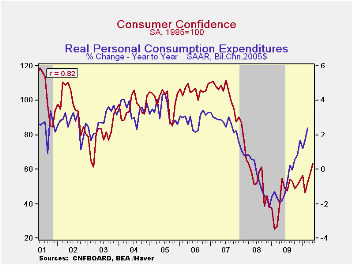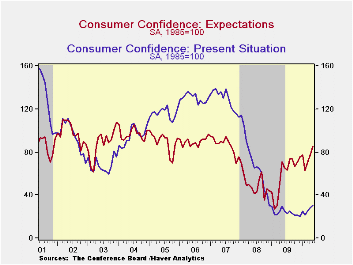 Global| May 25 2010
Global| May 25 2010U.S. Consumer Confidence Improves To Highest Since 2008
by:Tom Moeller
|in:Economy in Brief
Summary
The Conference Board indicated that consumer confidence was unshaken in early May by U.S. stock market declines nor by European market turmoil. Their consumer confidence index rose 9.7% m/m to 63.3, its highest level since March 2008. [...]

The Conference Board indicated that consumer confidence was unshaken in early May by U.S. stock market declines nor by European market turmoil. Their consumer confidence index rose 9.7% m/m to 63.3, its highest level since March 2008. The gain outpaced the Consensus expectation for a rise to 59.0. During the last ten years there has been an 82% correlation between the level of consumer confidence and the y/y change in real consumer spending. The Conference Board data can be found in Haver's CBDB database.
The expectations component of confidence improved the most m/m to its highest level since August 2007. Improved expectations for business conditions led the gain while expectations for employment and income rose to lesser extents. Consumers expect the inflation rate in twelve months to be 5.3% as they did last month and that remained down from last year's high of 7.7%. Interest rates in twelve months were expected to be higher by a lesser 54.1% of respondents but a slightly increased 12.5% expected rates to fall. A lessened 31.7% of respondents expected stock prices to rise.
Consumers' assessment of the present situation increased 7.1% m/m and May was improved by one-half from December's low. Jobs were seen as hard to get by a reduced 43.6% of respondents but jobs were seen as plentiful by only 4.6%. That was up just slightly from the series' historic low reached in November. Also improved was the percentage of respondents who saw business conditions as good. The percentage of consumers who thought business conditions were bad fell to 39.3%, off more-than ten points from its peak during the recession.
A reduced 1.9% of those surveyed plan to buy a home during the next six months. Also down slightly m/m to 26.2% were those who plan to buy a major appliance, versus 30.9% who planned to buy one back in 2007. An improved 6.0% plan to buy an automobile versus 6.0% in 2007 and a greater 2.8% plan to buy a new one, just off the series' historic low.
The Shape of Things to Come from the Federal Reserve Bank of San Francisco can be found here.


| Conference Board (SA, 1985=100) | May | April | March | y/y % | 2009 | 2008 | 2007 |
|---|---|---|---|---|---|---|---|
| Consumer Confidence Index | 63.3 | 57.7 | 52.3 | 15.5 | 45.2 | 57.9 | 103.4 |
| Present Situation | 30.2 | 28.2 | 25.2 | 1.7 | 24.0 | 69.9 | 128.8 |
| Expectations | 85.3 | 77.4 | 70.4 | 19.3 | 59.3 | 50.0 | 86.4 |
Tom Moeller
AuthorMore in Author Profile »Prior to joining Haver Analytics in 2000, Mr. Moeller worked as the Economist at Chancellor Capital Management from 1985 to 1999. There, he developed comprehensive economic forecasts and interpreted economic data for equity and fixed income portfolio managers. Also at Chancellor, Mr. Moeller worked as an equity analyst and was responsible for researching and rating companies in the economically sensitive automobile and housing industries for investment in Chancellor’s equity portfolio. Prior to joining Chancellor, Mr. Moeller was an Economist at Citibank from 1979 to 1984. He also analyzed pricing behavior in the metals industry for the Council on Wage and Price Stability in Washington, D.C. In 1999, Mr. Moeller received the award for most accurate forecast from the Forecasters' Club of New York. From 1990 to 1992 he was President of the New York Association for Business Economists. Mr. Moeller earned an M.B.A. in Finance from Fordham University, where he graduated in 1987. He holds a Bachelor of Arts in Economics from George Washington University.
More Economy in Brief
 Global| Feb 05 2026
Global| Feb 05 2026Charts of the Week: Balanced Policy, Resilient Data and AI Narratives
by:Andrew Cates






